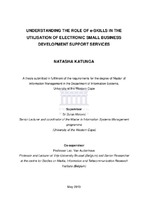Understanding the role of e-skills in the utilisation of electronic small business development support services
Abstract
The Internet is now facilitating the provision of an increasing number of
services. Thus, technology has become a more integrated part of people‟s
daily routine. Some of these technologies include electronic communication,
online banking, and shopping as well as electronic learning - to name but a
few. However, for various reasons, such as limited formal education (which is
a key promoter of reading and writing skills), access and skills, not everyone
has an equal opportunity to benefit from the use of these technologies. The
unequal distribution of opportunities of such nature is often broadly referred to
as the digital divide. That is the gap between those who have access to
Information and Communication Technology (ICT) and those who do not.
One noted challenge that influences the use of ICT consists of socioeconomic conditions, which together elicit high levels of poverty. An identified
strategy for uplifting these areas was (and still is) entrepreneurship, notably
small businesses. These small businesses however, generally have very
short and mostly unsuccessful lives. As a result the government at all levels
(national, provincial and local) has endeavoured to provide support to these
businesses. Some of this support is provided through mediums, such as the
Internet (here named “electronic support”) to assist these small businesses.
This support, which comes from government, is however, not being fully
utilised by the intended beneficiaries. Thus, the small businesses are not
benefiting from the support provided. Consequently, many are still
experiencing a short and unsuccessful existence. This research thus analyses
the small businesses in areas of the greater Cape Town, which are
characterised by high levels of poverty and unemployment.
Previous studies in these areas have reported the lack of ICT related skills,
also known as electronic skills (e-skills), as one of the reasons for the low
uptake of electronic support (e-support). This e-support is provided by various
levels of government through selected agencies (service providers).
In essence, this study is aimed at investigating the influence of e-skills in the
access and use of the provided e-support by owners of small businesses.
Considering that the lack of adequate e-skills has been identified as
influencing the use of e-support, the study also aims to identify the e-skills
needed to fully utilise the provided e-support.
The approach to this investigation included a review of pertinent literature and
devising a conceptual model. This model was then tested in the empirical
setting of this study. This setting included: (i) Providers of e-support (various
specialised government agencies) and (ii) the intended beneficiaries of this esupport, i.e. small businesses in the previously disadvantaged areas (PDAs)
of the greater Cape Town.
Through the use of case study methodology and face to face interviews, it
was found that many small business owners were not able to appropriately
use the provided e-support. This was due to their lack of e-skills, which
resulted in their inability to use ICT. Additionally, some were unaware of the
existence of the e-support or the service providers.
During the review of pertinent literature done as part of the study, an e-skills
framework was designed. The framework identified the e-skills considered
necessary in order for small business owners to effectively utilise the provided
e-support and other technologies. The e-skills framework suggested by this
study could be used as a tool to assist: (i) The providers of e-support to
understand the usage of their services and enable (ii) a more informed
understanding of the need for appropriate e-skills among small business
owners, in relation to their use of the provided e-support. Additionally, (iii)
small business owners should be in a better position to recognise the benefits
of using technology, especially the Internet.
The contribution of this study is seen as twofold. Firstly, it should assist the
providers and users of e-support. This is done by addressing the practical
side of the provision and usage of these services. Secondly, the study
contributes an informative e-skills framework related to the effective use of esupport. This study also furthers academic knowledge in the area of the
investigation, and suggests further directions for research.
Considering, the limited small business sample (only participants from three
PDAs), the generalisation of this study is limited. This limitation does not
however, influence the validity of this research, or the credibility of the
findings.
Related items
Showing items related by title, author, creator and subject.
-
The readiness and perceptions of public health dentists on electronic health records: Case of Cape town south Africa
de Vries, Heinca (University of Western Cape, 2020)This study aimed to understand the readiness and perceptions of Electronic Health Record (EHR) adoption among dentists in the public service of the Western Cape. A qualitative study design was chosen due to a lack of ... -
The factors that influence electronic payment adoption by SMEs in two cities of China
Hu, Guo Dong (University of the Western Cape, 2008)This study will refer specifically to the reasons why SMEs are not willing to use e-payment as their first-choice method: the reasons hampering e-payment adoption. -
The case for open access publishing, with special reference to open access journals and their prospects in South Africa
Möller, Allison Melanie (University of the Western Cape, 2006)Open access publishing is an initiative that aims to provide universal, unrestricted free access to full-text scholarly materials via the Internet. This presents a radically different approach to the dissemination of ...




